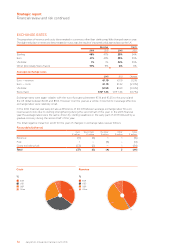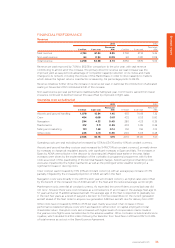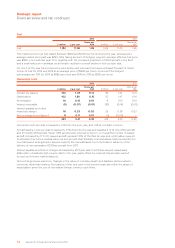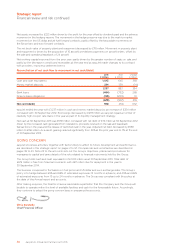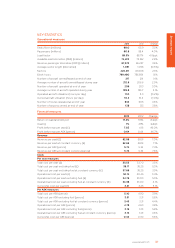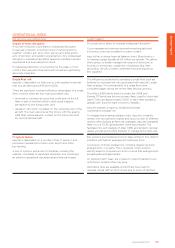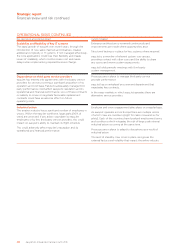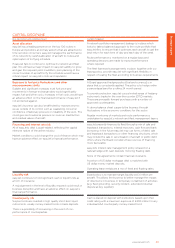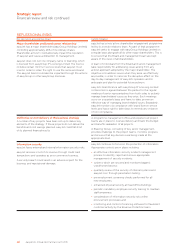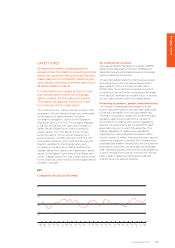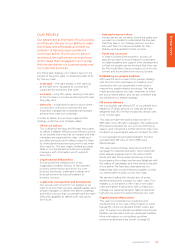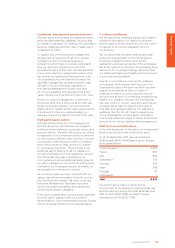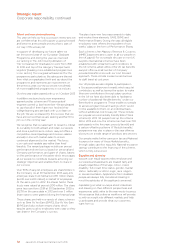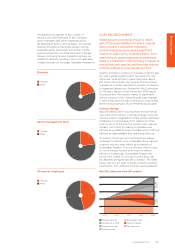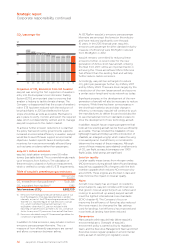EasyJet 2013 Annual Report Download - page 44
Download and view the complete annual report
Please find page 44 of the 2013 EasyJet annual report below. You can navigate through the pages in the report by either clicking on the pages listed below, or by using the keyword search tool below to find specific information within the annual report.
42 easyJet plc Annual report and accounts 2013
REPUTATIONAL RISKS
Risk description and potential impact Current mitigation
Major shareholder and brand owner relationship
easyJet has a major shareholder (easyGroup Holdings Limited)
controlling approximately 26% of its ordinary shares.
Shareholder activism could adversely impact the reputation
of easyJet and cause a distraction to management.
easyJet does not own its company name or branding, which
is licensed from easyGroup IP Licensing Limited. The licence
includes certain minimum service levels that easyJet must
meet in order to retain the right to use the name and brand.
The easyJet brand could also be impacted through the actions
of easyGroup or other easyGroup licensees.
easyJet has a very active shareholder engagement programme
led by its investor relations team. As part of that programme
easyJet seeks to engage with easyGroup Holdings Limited on
a regular basis alongside all its other major shareholders. This is
to ensure that the Board and management team are kept
aware of the views of all shareholders.
A team of individuals from the Board and senior management
take responsibility for addressing issues arising from any
activist approach adopted by the major shareholder. The
objective is to address issues when they arise, as effectively
as possible, in order to minimise the disruptive effect on the
day-to-day management of easyJet’s operation and to
anticipate and plan for potential future activism.
easyJet’s brand licence with easyGroup IP Licensing Limited
contains terms agreed between the parties for the regular
meeting of senior representatives from both sides to actively
manage brand-related issues as they arise. Such meetings
occur on a quarterly basis and have, to date, proven an
effective way of managing brand-related issues. Separately,
easyJet monitors its compliance with brand licence service
levels and has a right to take steps to remedy any instance
of non-compliance.
Ineffective or non-delivery of the business strategy
A number of key projects have been set up to deliver key
elements of the strategy. If these projects do not deliver the
benefits and cost savings planned, easyJet could fall short
of its planned financial results.
A programme management office and experienced project
teams are in place to oversee delivery and track the budget
and benefits realisation of all projects.
A Steering Group, consisting of key senior management,
provides challenge to the project teams, monitors progress
and ensures that key decisions are being made at the
appropriate level.
Information security
easyJet faces external and internal information security risks.
easyJet receives most of its revenue through credit card
transactions and operates as an e-commerce business.
A security breach could result in an adverse impact for the
business and reputational damage.
easyJet continues to focus on the protection of information.
Appropriate controls are in place including:
• an effective information security incident management
process to identify, report and ensure appropriate
management of security incidents;
• systems which are secured and monitored against
unauthorised access;
• quarterly review of the security of internal systems and
easyJet.com through penetration testing;
• pre-employment screening checks performed for all
new employees;
• enhanced physical security at head office buildings;
• periodic mandatory employee security training to maintain
staff awareness;
• consideration of information security risks within
procurement processes; and
• monitoring and control of scanning software for fraudulent
customer activity by the Revenue Protection team.
Strategic report
Financial review and risk continued


